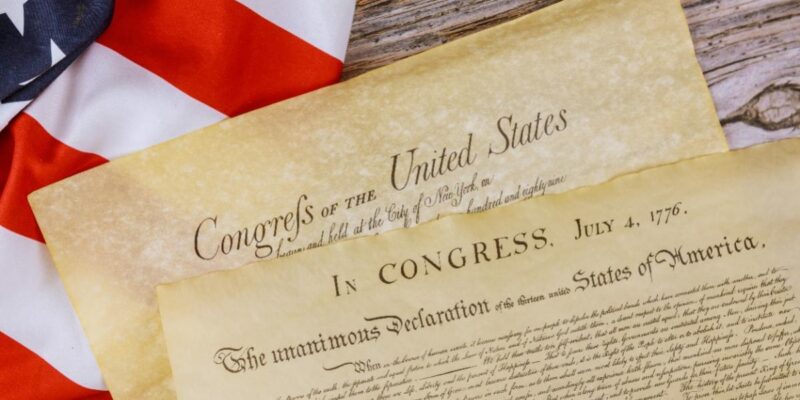
In a recent column, I discussed an argument about secession made by Abraham Lincoln and sympathetically expounded by Michael P. Zuckert in his important book A Nation So Conceived. Lincoln maintained that a nation once formed could not allow secession because doing so would open it to unlimited fissiparous tendencies, culminating in anarchy. This argument did not address the problem of slavery, surely relevant to the concrete circumstances of the Civil War. Zuckert has a suggestive, though in my view mistaken, discussion of Lincoln’s view of secession and slavery, and in this week’s article, I’ll try to explain Zuckert’s position and the difficulties he faces defending it.
Zuckert’s position is this: Lincoln considered slavery to be morally wrong and contrary to the Declaration of Independence, which he took to state universally valid truths that were binding on the American nation. It may seem at first hard to claim this because slavery existed at the time of the declaration and continued to exist from that point until the secession crisis that confronted Lincoln after his victory in the presidential election of 1860. But in response to this fact, Lincoln said that at the time of our nation’s founding, it was recognized in all sections of the country that slavery was an evil. Even those who held slaves believed this and hoped that through gradual emancipation it ultimately would become extinct.
Things changed after the cotton gin made slave labor much more productive and profitable than it had been in the eighteenth slavery, and some Southerners, most notably John C. Calhoun, rejected the equality clause of the Declaration of Independence and viewed slavery as a positive good. This Lincoln could not abide, and he was determined to respond to the challenge by using the secession crisis and the war he foresaw as its inevitable result to bring slavery to an end.
To this narrative there is an obvious objection. Lincoln said in his first inaugural address that he didn’t intend to interfere with slavery in the states where it existed and that he believed he had no constitutional power to do so. Further, a topic Zuckert doesn’t mention, Lincoln favored the amendment proposed by Thomas Corwin of Ohio, which would have prevented Congress from interfering with slavery in any of the states.
Zuckert’s answer is that Lincoln intended his first inaugural to be provocative:
Lincoln tells us of his hopes but what are his expectations of the real-world outcomes? He is going to hold government property, including the forts still under government control, and he is going to collect the revenue. He is, in a word, asserting a claim to the two central attributes of governance, the sword and the purse. . . . The assertion of power to collect the revenue is especially irksome in South Carolina, site of the nullification crisis during the Andrew Jackson years . . . Lincoln’s apparently pacific and placatory role seems much less so when viewed in toto.
Why did Lincoln follow a policy of provocation? One reason was that he rejected secession and was prepared to fight to overturn it. But Zuckert thinks Lincoln had another goal as well. He reads Lincoln’s goals as in line with his earlier “House Divided” speech; provocation might provide a chance to end slavery:
It is tempting to say that the most revealing part of the speech in Lincoln’s mind was the invocation of a “crisis” that must be reached and passed before the agitation over slavery will end. Lincoln’s image of a crisis that must be reached puts one in mind of the course of a fever. The serious ones rage until they reach crisis stage—a very high fever that threatens the life of the patient before it breaks and the patient, the lucky one, returns to health. It is not difficult to read the “House Divided” speech as a prediction or even a prescription for such a cause and cure. Beneath the moderation of his policy proposals lies the more extreme possibility that Lincoln’s insistence on an end to slavery expansion and on a public condemnation of slavery has the goal or expected effect not of putting the public mind at ease but rather of bringing the nation to that crisis that must be passed before health can return.
Zuckert’s argument fails because it neglects a key point. Lincoln indeed opposed slavery, but what primarily concerned him was the agitation over slavery that threatened the country’s legal institutions. So long as the slave states recognized that slavery was bad, Lincoln was in no hurry to get rid of it. The trouble lay rather with those who thought slavery a positive good and wished to create a slave empire. Zuckert recognizes Lincoln’s concern but fails to see its full consequences in interpreting Lincoln’s aims. Zuckert says:
He followed his insight that the statesmanship of [Henry] Clay . . . proffered a constant incentive to proslavery forces to push for greater gains by reraising the threat of secession. As Lincoln made clear over and over again between 1850 and 1861, to give into these plans by allowing slavery expansion would not cement the Union for the future but would merely temporarily slake the thirst for slavery expansion, and in the longer run the nation would have to face the threats and provocations once again.
Why should my interpretation of Lincoln’s policy, not Zuckert’s, be accepted? The answer lies in what happened after the Southern surrender. Once the Southern states signified a pro forma rejection of slavery by accepting the Thirteenth Amendment, Lincoln was entirely content for the old Sothern elites to resume their positions of power and for many blacks to continue in a condition little better than bondage. It is exactly for this that the leftist legal academic Sanford Levinson takes Lincoln to task in the foreword to Zuckert’s book:
In his own book on Lincoln’s last speech, the historian Louis Masur quotes Indiana Radical Republican senator George Julian that Lincoln’s assassination might have been a gift presented by a providential God who presumably supported the Radicals. Had Lincoln lived, he would have had to give concrete meaning to the notion (and limits) of a “mild” Reconstruction.
Slavery was no doubt a bad thing to Lincoln, but what goaded him into action was his wish to crush secession.








